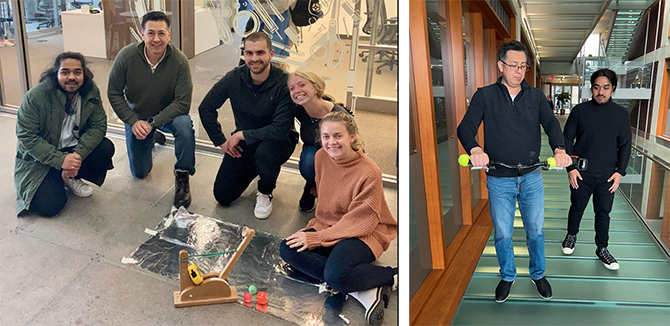Finding Empathy for Bike Riders
mpd² students’ bicycle-safety capstone project highlights the importance of following where the research leads when developing new products.

Riding a bike can be a journey filled with twists, turns, and tumults. The same can be said for product development.
Five students in Northwestern Engineering's Master of Product Design and Development Management (mpd²) program are in the midst of discovering just that as part of their capstone project — a three-quarter experience designed to help students develop a profitable and marketable solution to a customer problem.
The students – Ali Julian (mpd² '23), Carlos Barros (mpd² '23), Hasan Priyo (mpd² '23), Kenny Riggott (mpd² '23), and Samantha Soloway (mpd² '23) – have been working to develop a product that helps commuters safely use shared bicycle services. What they've realized along the way is it's not always as simple to move from concept to reality as it might appear.
“It has been a very exciting journey,” Priyo said. “Considering every step we had to go through as a team from product ideation to design to prototype, it has truly been amazing to see the birth of a product.”
The product they birthed, however, was not what they originally intended to develop. Their idea evolved based on their research – especially end-user input – a reality at the core of the mpd² program and central to the capstone project.
Capstone brings together students in small groups, each with a mission to solve a real problem with a real solution. The class culminates with the students giving a 20-minute presentation that includes their solution, business case, and design of their product to an audience of industry leaders and potential investors.
This group of students originally thought of designing a collapsible helmet to promote safety for riders who rent bicycles and scooters. Their research soon changed to focus on preventing accidents rather than lessening the damage they cause.
“There is such a mismatch between bikes and cars that in a bad accident on a road, all the protective gear in the world might not be enough,” Julian said. “We wanted to empower bikers by giving them access to some of the same signaling technology that every driver has available right at their fingertips.”
Thus, their helmet idea morphed into Roadie, a handlebar accessory that aims to improve communication between bike riders and cars. Roadie features smart handlebar grips, highly visible signal indicators, and a speaker that could play a horn or bell. It also syncs with navigation or workout applications.
The team envisions developing premium features such as intelligent blind spot detection.
Now the students are thinking about taking their product from the classroom into the marketplace.
“I hope to have a minimal viable product that we can take to market,” Soloway said. “Our team is excited about the solution we’ve created and feel confident in our ability to continue this work beyond the program requirements.”
Each of the students said effective teamwork and communication is vital for success on the capstone project – and in life as an mpd² student.
Those two skills make living with the uncertainty of the product development process something to relish rather than fear.
“Believing in the process and enjoying the journey is key to making the most of the mpd² program experience,” Barros said. “While it may seem like a long time, the time will go by faster than one might expect. Make sure you learn from the challenges and setbacks, but don’t forget to celebrate success along the way.”
Priyo said the capstone project helps teach students important skills they will be able to use for the rest of their careers.
“Capstone is an amazing process that goes beyond just learning about building a product,” he said. “It allows you to understand a problem for the customer segment with empathy and consideration.”
